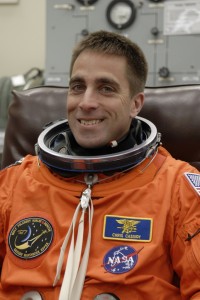The 500th person in space
Next month, when space shuttle Endeavour arrives in orbit to begin its 16-day space station construction mission (Note: The launch has been postponed to July 11), Chris Cassidy might feel more than the usual satisfaction. On his first shuttle flight, the former Navy SEAL, who wasn’t even born when …

Next month, when space shuttle Endeavour arrives in orbit to begin its 16-day space station construction mission (Note: The launch has been postponed to July 11), Chris Cassidy might feel more than the usual satisfaction. On his first shuttle flight, the former Navy SEAL, who wasn't even born when Apollo 11 landed on the moon, will become the 500th person in space.
The honor is due less to Cassidy's unquestioned worthiness than to where he'll be sitting. As of today, 498 people have been to space. When Endeavour blasts off, four people will be on the upstairs flight deck: Commander Mark Polansky, Pilot Doug Hurley, and (sitting behind them) Cassidy and Canadian astronaut Julie Payette. Polansky and Payette both have flown on the shuttle before. That makes Hurley (who'll be sitting upfront) #499, and Cassidy #500. I suppose we could quibble about who'll really be "first," since the shuttle arrives in orbit upside down, there will be other first-time astronauts downstairs (now "upstairs"?), and everyone gets there at pretty much the same time anyway. But let's not. It's Cassidy, according to NASA. And although agency spokesman Kyle Herring doesn't know what, if anything, the astronauts might do to mark it, "the crew is aware of the milestone."
It's always fascinating to look at the table of space demographics maintained by veteran CBS News space correspondent Bill Harwood. To get to the current count of 498, he applied certain ground rules. Anyone who has flown above 100 kilometers (62 miles, the generally accepted definition of "space") makes the list. So you'll find Joe Walker, who flew the X-15 to 354,200 feet (107.96 km) on August 22, 1963. And you'll find Mike Melvill and Brian Binnie, who took SpaceShipOne above 100 km in 2004.
Not every list maker is so generous. The authors of the German Spacefacts website put the current tally at 495, since they only count people who have reached orbit. No Walker, no Binnie or Melvill. Alan Shepard doesn't even make the list until #48, when he goes to the moon on Apollo 14.
Two things strike me from looking at these lists. One is that it took 20 years from Yuri Gagarin's first flight in 1961 before the 100th person reached space. That same year, 1981, the space shuttle started ferrying large groups into orbit. Once the shuttle retires, the numbers will drop again, unless space tourism really kicks in.
The other thing I notice about these demographics is the dominance of Russian cosmonauts when it comes to total time spent in space. The 19 most experienced space travelers are Russian. Leading the pack is Sergei Krikalev, who has spent 803 days of his life—more than two years—in orbit. So even though NASA has a big lead in the number of people launched, it's the Russians who really have the hang time.